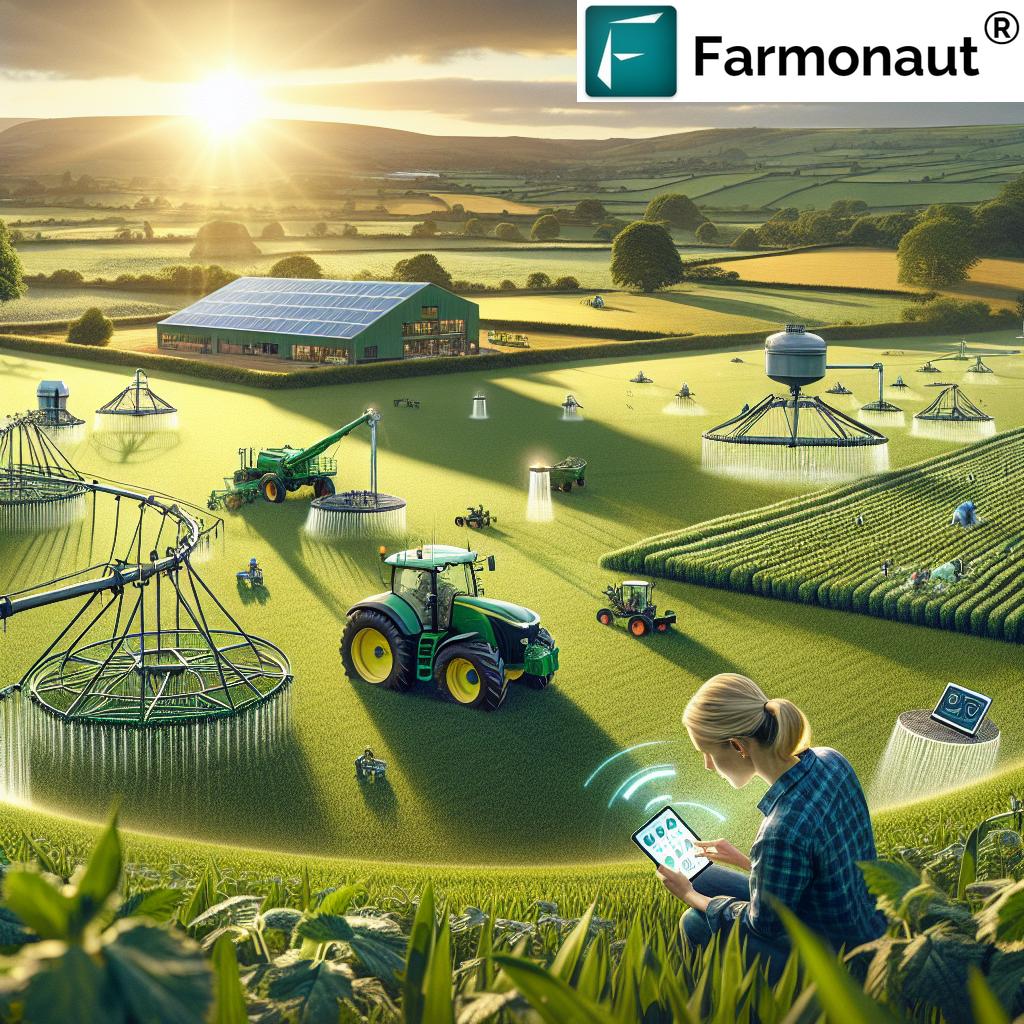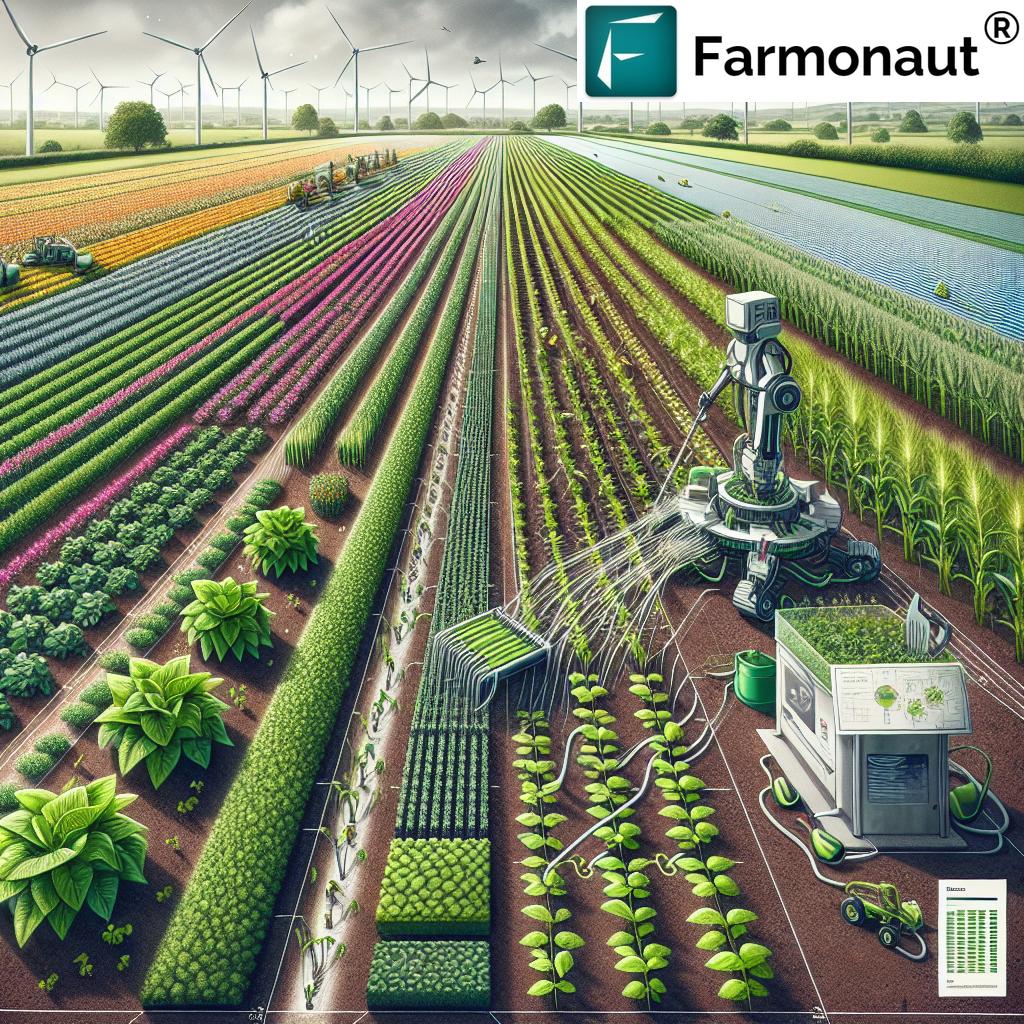Revolutionizing UK Agriculture: Innovative AgriTech Solutions for Sustainable Farming in Gloucestershire
“The low carbon agriculture show featured presentations on over 5 key areas, including waste management, bioenergy crops, and irrigation systems.”
In the heart of Gloucestershire, a revolution is taking place in the world of agriculture. As we stride into an era where sustainability and technology converge, the recent low carbon agriculture show has illuminated the path forward for UK farming. We at Farmonaut, a pioneering force in agricultural technology, were proud to be part of this groundbreaking event that showcased the future of sustainable agriculture innovations and low carbon farming practices.
The show was a melting pot of ideas, bringing together farmers, agritech entrepreneurs, researchers, and rural communities to explore and discuss the latest advancements in agricultural sustainability technologies. From cutting-edge irrigation systems to innovative waste management solutions, the event underscored the critical role of technology in shaping modern agriculture.
The AgriTech Revolution in Gloucestershire
Gloucestershire, with its rich agricultural heritage, stands at the forefront of this AgriTech revolution. The county’s diverse landscape, ranging from the rolling hills of the Cotswolds to the fertile plains of the Severn Vale, provides an ideal testing ground for innovative agritech solutions for farmers. These solutions are not just transforming individual farms; they’re reshaping the entire agricultural landscape of the UK.

At the heart of this transformation is the push towards sustainable food production and reducing the carbon footprint in agriculture. The show highlighted how AgriTech is not just about fancy gadgets but about creating practical, scalable solutions that can be adopted by farmers of all sizes.
Bridging the AgriTech Perception Gap
One of the key themes of the event was bridging the AgriTech perception gap between developers and farmers. This is crucial for the widespread adoption of agricultural technology. We understand that for AgriTech to truly revolutionize farming, it must be accessible, understandable, and demonstrably beneficial to farmers.
To this end, the show featured interactive demonstrations and hands-on sessions where farmers could see and experience the latest technologies firsthand. From drone-based crop monitoring systems to AI-powered pest detection tools, these demonstrations helped demystify AgriTech and showcase its practical applications in day-to-day farming operations.
Sustainable Agriculture Innovations: A Deep Dive
The event spotlighted several key areas of innovation in sustainable agriculture. Let’s explore some of the most promising developments:
1. Precision Irrigation Systems
Water scarcity is a growing concern in agriculture. Advanced irrigation systems using IoT sensors and AI algorithms are revolutionizing water management on farms. These systems can precisely determine when and how much water crops need, significantly reducing water waste while improving crop yields.
2. Bioenergy Crops
The show highlighted the potential of bioenergy crops as a sustainable alternative to fossil fuels. These crops not only provide a renewable energy source but also offer farmers an additional revenue stream. Innovations in crop varieties and harvesting techniques are making bioenergy production more efficient and economically viable.
3. Integrated Pest Management (IPM)
IPM technologies are transforming how farmers deal with pests and diseases. By combining biological controls, targeted pesticide use, and AI-powered early detection systems, IPM offers a more sustainable and effective approach to crop protection.
4. Soil Health Monitoring
Maintaining soil health is crucial for sustainable agriculture. New technologies for real-time soil analysis, including portable spectrometers and IoT-enabled soil sensors, are giving farmers unprecedented insights into their soil’s health, enabling more precise and sustainable land management practices.
“Farmonaut, a leading AgriTech company, showcased innovations addressing at least 3 major farming challenges: pest control, disease management, and soil health.”
Farmonaut’s Contribution to Sustainable Farming
At Farmonaut, we’re proud to be at the forefront of this agricultural revolution. Our satellite-based farm management solutions are designed to make precision agriculture accessible and affordable for farmers worldwide. Through our platform, farmers can access real-time crop health monitoring, AI-based advisory systems, and resource management tools.
Our technologies align perfectly with the themes of sustainability and innovation highlighted at the show. For instance, our satellite-based crop health monitoring system helps farmers optimize resource use, reducing waste and improving yields. This technology is particularly relevant in addressing the challenges of sustainable farming in Gloucestershire and beyond.
Explore our innovative solutions:
Low Carbon Farming Practices: The Future of Agriculture
The shift towards low carbon farming practices was a central theme of the show. These practices are not just environmentally responsible; they’re also economically smart. Here are some key low carbon farming practices highlighted at the event:
- Precision Agriculture: Using data and technology to optimize resource use.
- Conservation Tillage: Minimizing soil disturbance to reduce carbon emissions.
- Cover Cropping: Planting crops to protect and enrich the soil between harvests.
- Agroforestry: Integrating trees and shrubs into crop and animal farming systems.
- Renewable Energy Use: Harnessing solar, wind, and biogas energy on farms.
These practices not only help in reducing the carbon footprint of agriculture but also contribute to improving soil health, water retention, and overall farm productivity.
Innovative Waste Management in Farming
Waste management in agriculture is a critical aspect of sustainable farming. The show presented several innovative approaches to tackle this challenge:
- Anaerobic Digestion: Converting organic waste into biogas and nutrient-rich fertilizer.
- Composting Technologies: Advanced systems for efficient composting of agricultural waste.
- Plastic Recycling: Innovative solutions for recycling agricultural plastics.
- Precision Feeding Systems: Reducing waste in animal farming through optimized feeding.
These waste management solutions not only reduce the environmental impact of farming but also create new value streams for farmers, turning waste into resources.
AgriTech Incubation and Growth: Nurturing Innovation
The show also highlighted the importance of AgriTech incubation and growth. Gloucestershire, with its strong agricultural base and growing tech sector, is becoming a hub for AgriTech startups. Incubators and accelerators are playing a crucial role in nurturing these innovative businesses, providing them with resources, mentorship, and networking opportunities.
This ecosystem of support is vital for the development and scaling of new AgriTech solutions. It’s creating a fertile ground for innovation, where ideas can grow into practical solutions that benefit farmers and the environment alike.
The Role of Partnerships in Driving Innovation
One of the key takeaways from the event was the importance of partnerships in driving agricultural innovation. Collaboration between farmers, technology developers, researchers, and policymakers is crucial for the successful development and adoption of sustainable farming practices.
These partnerships are essential for:
- Ensuring that AgriTech solutions address real-world farming challenges
- Facilitating knowledge transfer between academia and industry
- Creating supportive policy frameworks for sustainable agriculture
- Pooling resources for research and development
By fostering these partnerships, we can accelerate the transition towards more sustainable and efficient farming practices in Gloucestershire and beyond.
The Impact of AgriTech on Rural Communities
The adoption of AgriTech solutions is not just transforming farming practices; it’s also having a significant impact on rural communities in Gloucestershire. Here’s how:
- Job Creation: The growth of the AgriTech sector is creating new job opportunities in rural areas, from tech-savvy farm managers to AgriTech consultants.
- Economic Diversification: AgriTech is helping to diversify rural economies, reducing dependence on traditional farming alone.
- Attracting Young Talent: The integration of technology in farming is making agriculture more attractive to younger generations, helping to address the issue of an aging farming population.
- Improved Rural Infrastructure: The need for better connectivity to support AgriTech is driving improvements in rural digital infrastructure.

Challenges and Opportunities in AgriTech Adoption
While the potential of AgriTech is immense, its adoption is not without challenges. The show addressed some of these challenges and discussed potential solutions:
- Digital Literacy: Many farmers, especially older generations, may struggle with adopting new technologies. Training programs and user-friendly interfaces are crucial.
- Initial Investment: The upfront cost of AgriTech solutions can be a barrier for small farmers. Innovative financing models and government support can help address this.
- Data Privacy and Security: As farming becomes more data-driven, ensuring the security and privacy of farm data is paramount.
- Connectivity Issues: Poor internet connectivity in rural areas can hinder the adoption of IoT and cloud-based AgriTech solutions.
Addressing these challenges is crucial for the widespread adoption of AgriTech solutions and the realization of their full potential in transforming UK agriculture.
The Future of Farming: A Vision for Gloucestershire
As we look to the future, the vision for farming in Gloucestershire is one of sustainability, efficiency, and innovation. We envision:
- Farms powered by renewable energy, with minimal carbon footprints
- Precision agriculture techniques optimizing resource use across all farm sizes
- A thriving AgriTech sector, providing jobs and driving rural economic growth
- Sustainable farming practices that protect and enhance Gloucestershire’s beautiful landscape
- A new generation of tech-savvy farmers leading the way in agricultural innovation
This vision is not just a dream; it’s a roadmap for the future of farming in Gloucestershire and the UK as a whole.
AgriTech Solutions for Sustainable Farming in Gloucestershire
| AgriTech Solution | Sustainability Benefits | Estimated Carbon Footprint Reduction | Implementation Challenges |
|---|---|---|---|
| Precision Irrigation Systems | Reduced water usage, improved crop yields | 10-20% | High initial cost, requires technical expertise |
| Bioenergy Crops | Renewable energy source, additional income for farmers | 30-40% | Land use competition, processing infrastructure needed |
| Integrated Pest Management | Reduced pesticide use, improved ecosystem health | 15-25% | Requires ongoing monitoring, initial pest pressure increase |
| Soil Health Monitoring | Improved soil quality, reduced fertilizer use | 20-30% | Data interpretation complexity, sensor calibration |
Conclusion: Embracing the AgriTech Revolution
The low carbon agriculture show in Gloucestershire has clearly demonstrated that the future of farming lies at the intersection of technology and sustainability. As we’ve explored in this blog post, from innovative waste management solutions to advanced crop monitoring systems, AgriTech is providing farmers with the tools they need to meet the challenges of the 21st century.
At Farmonaut, we’re committed to being a part of this revolution. Our satellite-based solutions are designed to make precision agriculture accessible to farmers of all sizes, helping to drive the adoption of sustainable farming practices across the UK and beyond.
The journey towards sustainable agriculture is ongoing, and it requires the continued collaboration of farmers, technologists, researchers, and policymakers. By embracing these innovative AgriTech solutions, we can create a future where farming is not only more productive and profitable but also more sustainable and environmentally friendly.
As we look to the future of farming in Gloucestershire and across the UK, one thing is clear: the AgriTech revolution is here, and it’s transforming agriculture for the better. Let’s embrace this change and work together towards a more sustainable and prosperous agricultural future.
Frequently Asked Questions
- What is AgriTech?
AgriTech refers to the use of technology in agriculture to improve efficiency, productivity, and sustainability. It encompasses a wide range of solutions from precision farming tools to AI-powered crop management systems. - How is AgriTech contributing to sustainable farming?
AgriTech contributes to sustainable farming by optimizing resource use, reducing waste, improving crop yields, and minimizing environmental impact through precision agriculture techniques and data-driven decision-making. - What are some examples of low carbon farming practices?
Examples include precision agriculture, conservation tillage, cover cropping, agroforestry, and the use of renewable energy on farms. - How can farmers in Gloucestershire adopt AgriTech solutions?
Farmers can start by attending workshops and demonstrations, connecting with local AgriTech providers, and gradually implementing technologies that best suit their farm’s needs and budget. - What role does Farmonaut play in the AgriTech revolution?
Farmonaut provides satellite-based farm management solutions that enable precision agriculture, offering tools for crop health monitoring, resource management, and data-driven decision-making.
Explore Farmonaut’s API and Developer Documentation:
Farmonaut Subscriptions






